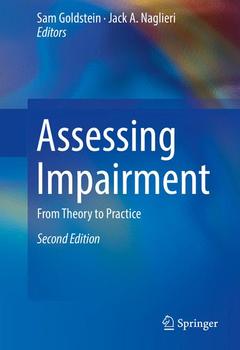Description
Assessing Impairment (2nd Ed., 2nd ed. 2016)
From Theory to Practice
Coordinators: Goldstein Sam, Naglieri Jack A.
Language: English
Subjects for Assessing Impairment:
Keywords
Adaptive behaviors and impairment; Assessing Impairment; Barkley Functional Impairment Scales; Child and Adolescent Functional Assessment Scale; Columbia Impairment Scale; DSM-5 model of impairment; Diagnostic and Statistical Manual; Geriatric populations and impairment; Impairment; Impairment Rating Scale; Impairment definition; concept; and theory; Impairment in adults; Impairment in children; Medical model of impairment; Neuropsychological Impairment Scale; Rating Scale of Impairment; Sheehan Disability Sca
Publication date: 12-2016
Support: Print on demand
Publication date: 10-2017
Support: Print on demand
Description
/li>Contents
/li>Biography
/li>Comment
/li>
This Second Edition of the book expands on the in-depth treatment of the theory, definition, and evaluation of impairment presented in the original volume. It explores the complex relationships between disabling conditions and impairment, with new data and insights on assessment and potential avenues for treatment. Original and revised chapters critique current models of impairment and offers an integrated model rooted in the contexts of medical, mental health, and cognitive challenges in disability. Leading scholars and clinicians provide updated evidence for a much-needed reconceptualization of impairment within the context of diagnosis and disability. This contextual approach to assessment ? a wide-ranging quality-of life perspective ? goes beyond symptom counting, resulting in more accurate diagnosis, targeted interventions, and improved patient functioning.
Topics featured in this book include:
- The role of family and cross-setting supports in reducing impairment.
- Relationships between adaptive behavior and impairment.
- Legal conceptions of impairment and its implications for the assessment of psychiatric disabilities.
- Impairment in parenting.
- The Neuropsychological Impairment Scale (NIS).
- The Barkley Functional Impairment Scale (BFIS).
- The Rating Scale of Impairment (RSI).
- Treatment integrity in interventions for children diagnosed with DSM-5 disorders.
Assessing Impairment, Second Edition, is a must-have resource for researchers, clinicians, professionals, and graduate students in clinical child, school, and developmental psychology as well as child and adolescent psychiatry, educational psychology, rehabilitation medicine/therapy, social work, and pediatrics.
Sam Goldstein, Ph.D., is a doctoral level psychologist with areas of study in school psychology, child development, and neuropsychology. He is licensed as a psychologist and certified as a developmental disabilities evaluator in the State of Utah. Dr. Goldstein is a Fellow in the National Academy of Neuropsychology and American Academy of Cerebral Palsy and Developmental Medicine. Dr. Goldstein is an Assistant Clinical Instructor in the Department of Psychiatry. Since 1980, Dr. Goldstein has worked in a private practice setting as the Director of a multidisciplinary team, providing evaluation, case management, and treatment services for children and adults with histories of neurological disease and trauma, learning disability, adjustment difficulties, and attention deficit disorder. Dr. Goldstein is on staff at the University Neuropsychiatric Institute. He has served as a member of the Children’s Hospital Craniofacial Team. He has also been a member of the Developmental Disabilities Clinic in the Department of Psychiatry at the University of Utah Medical School.
Dr. Goldstein has authored, co-authored or edited 38 clinical and trade publications, including 17 text books dealing with managing children's behavior in the classroom, genetics, attention disorder and adult learning disabilities. With Barbara Ingersoll, Ph.D., he has co-authored texts dealing with controversial treatments for children’s learning and attention problems and childhood depression. With Anne Teeter Ellison, he has authored Clinician’s Guide to Adult ADHD: Assessment and Intervention. With Nancy Mather, Ph.D., he has completed 3 texts for teachers and parents concerning behavioral and educational issues. With Michael Goldstein, M.D., he has completed two texts on attention deficit hyperactivity disorder. He has edited 3 texts with Cecil Reynolds, Ph.D., on neurodevelopmental and genetic disorders in children. With Robert Brooks, Ph.D., he has authored 11 texts includ
Expands and updates First Edition’s analysis of theory and research on impairment
Addresses improved diagnoses, interventions, and patient functioning according to DSM-5 and other medical models
Explores issues of resilience, adaptive behaviors, and treatment integrity
Examines impairment across broad domains of physical, educational, and cognitive disabilities
A must-have companion to the Impairment Rating Scale
Includes supplementary material: sn.pub/extras




